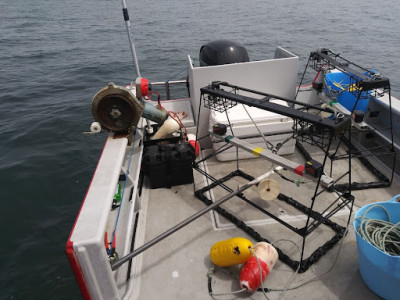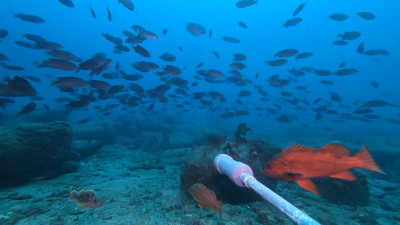PRINCIPAL INVESTIGATORS: Jennifer Caselle (UC Santa Barbara)
PROJECT ADMINISTRATOR: California Sea Grant
PROJECT HIGHLIGHT:
This project continues long-term mid-depth reef data collection using Baited Remote Underwater Video (BRUVs) in the oldest region of the California MPA network. This will provide critical data on habitat and environmental conditions of key fisheries and non-fisheries species, helping to guide adaptive management of the state’s Marine Protected Area network.
PROJECT SUMMARY:

California’s mid-depth rocky reef habitats—approximately 30-100 meters deep—provide essential habitats for many fish and invertebrates, including species important for commercial fisheries. However, these important ecosystems are less studied due to their depth. This project builds on more than 6 years of prior data collection in this habitat, with the goal continuing collecting long-term data from these areas to better understand how marine protected areas (MPAs) are performing and how different species respond to environmental changes over time.
This project studies changes occurring in California’s mid-depth rocky reef habitats at several Southern California sites using underwater cameras called Stereo BRUVs (Baited Remote Underwater Video). BRUVs are a simple and cost-effective visual tool that let scientists observe marine life without disturbing it. BRUVs capture video data that shows which species are present, how large they are, and how they interact with their habitat. Data from this project will be combined with past data to better understand patterns over time. Long time series also allow for refinements of monitoring protocols, as part of adaptive management. In addition, the team will create accessible workflows and protocols for processing the BRUV imagery and data so that future projects can build on this work more easily.

This research is part of a larger number of projects conducting long-term monitoring of the California MPA Network, supported by California Ocean Protection Council and California Department of Fish and Wildlife. Ultimately, this research will reinforce California’s continued leadership in ocean conservation by providing reliable, long-term information about mid-depth reef ecosystems. This will help scientists and resource managers make informed decisions about how to protect marine life and maintain healthy resilient ocean environments.